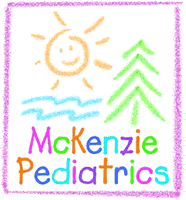Parents: Beware of Childhood Infections
By Dr. Todd Huffman
For the Eugene Register-Guard, November 26, 2006
Keeping children healthy is a goal shared by teachers, families and physicians. Many factors make staying healthy a challenge; perhaps the greatest is infection. When children enter group setting, such as playgroups, daycares, preschools and schools, they are exposed to many common germs.
Reducing their risk of infection requires that teachers, parents and caregivers know the myths and facts of infection control.
Most germs and infections are spread primarily by contact, such as by touching the infectious bodily fluids of someone who has germs that cause disease, or touching an object or surface they’ve recently contaminated with those germs. In child care and school settings, the surfaces of floors, activity and food tables, diaper changing tables, doorknobs, toilet room surfaces and faucet handles, toys, and fabric objects may have a lot of germs on them if they are not properly and routinely sanitized.
Coughing and sneezing can also spread germs, by sending infectious droplets from a person who has a disease such as a cold into the air that other persons in close contact can then breathe into their lungs. Children older than 2 should be taught how to “cough in their elbow” or onto their shoulder; teaching kids to cover their cough with their hands only increases the spread of germs as they then touch surfaces then touched by others.
The most common type of childhood infection is the common cold. Several hundred common respiratory germs are known to cause coughs and colds. While discomforting, most are relatively harmless, and resolve without treatment. Very young children in group settings can expect an average of six to eight colds each year.
Choosing to breast feed is the earliest important decision parents can make in reducing infections in young children. Making sure young children receive their recommended vaccinations is also crucial. Most germs that children are vaccinated against exist in their everyday lives, not just in history books. The risk of exposure to vaccine-preventable diseases is increased when children gather in groups for any reason.
Healthy nutrition builds a healthy immune system. A diet loaded with fresh fruits and vegetables, whole grains, and proteins is essential at all ages for overall health. Parents of children older than a year should discuss with their child’s physician the benefit of a daily multi-vitamin.
Every group setting for children, including the home, should have accessible sinks with disposable facial tissues, warm water, soap, disposable towels, hand lotion, hand sanitizer, and easy-to-understand posted instructions for children. Adults should model good hand washing and hygiene practices by washing their hands after diapering, toileting, handling garbage, or wiping noses or mouths. Adults and children should wash their hands after eating, handling pets, or cleaning up, and when arriving and leaving for the day or moving from one group of children to another.
Hands should be washed vigorously with soap under warm water for at least 30 seconds while singing the entire ABC song aloud and slowly. Dry hands with a clean, disposable paper towel. Hand sanitizer rubbed between the hands and fingers for at least 15 seconds is considered an acceptable alternative to soap and water.
Parents should keep home from daycare, preschool or school any child with a temperature above 101 degrees, diarrhea, vomiting more than two times in the previous 24 hours, abdominal pain that continues for more than two hours, mouth sores with drooling, rash with fever, or mucous drainage from the eye until treatment has been started. Children with strep throat or impetigo may not return to school until 24 hours after treatment has been started. Children with head lice or nits, scabies, or ringworm, may return to school the morning following the first treatment.
Finally, common colds, coughs, and runny noses no matter the color are NOT reasons to exclude children from group settings. Neither is watery eye discharge without fever or mucous, nor rashes without fever.
